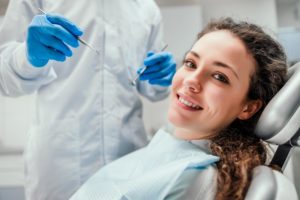OUTSIDE THE DENTAL BOX
August 29, 2022
 You may have heard the phrase “the mouth is the gateway to the rest of the body.” The mouth is connected to the rest of the body, and the only healthcare providers who spend time examining this area are your dental team. The days of the dentist being just the “tooth fixer” are gone. The key here is the practitioner thinking “outside the box” and treating each patient’s total-body health.
You may have heard the phrase “the mouth is the gateway to the rest of the body.” The mouth is connected to the rest of the body, and the only healthcare providers who spend time examining this area are your dental team. The days of the dentist being just the “tooth fixer” are gone. The key here is the practitioner thinking “outside the box” and treating each patient’s total-body health.
The average physician spends seven minutes every two years with a patient. There may be a 5 second glance inside the mouth during those visits. If you see a dentist on a regular basis, we (dentists and hygienists) spend an hour twice a year concentrating on a very specific region of the body. There is a lot of information available within that tiny little space.
For example, everyone has heard of gum or periodontal disease. While many patients and dentists see periodontal disease as a tooth or oral health problem, the fact is, it is a bacterial disease and bacteria can travel throughout the body. About a dozen of the nearly 7,000 types of oral bacteria can wreak havoc on the body, not just the oral cavity.
In a study that looked at blood clots from acute heart attack and stroke patients, researchers found that oral bacteria in the clots were 16 times more concentrated than in the surrounding blood. I think it is safe to say that sometimes there is more going on than what we can see in the dental chair.
Some dentists are recommending salivary testing as they believe that it is a crucial part of diagnosing and reversing oral bacteria and inflammation. The salivary tests can show whether patients have abnormally high levels of the specific bacteria associated with heart disease, diabetes, and other systemic conditions. Diagnosis can then lead to treating the bacteria with a combination of antibiotics, antimicrobials and specific homecare techniques. In a perfect world, this information would be shared with the rest of the patient’s medical team to be able to provide comprehensive total-body care.
This is the same reason many dentists screen patients for sleep-disordered breathing. Sleep affects the function of the entire body. For a dentist, there is more to screening for sleep apnea than simply asking patients about snoring. Bruxing (grinding), clenching, and gastric reflux are just a few other signs to look deeper and ask more questions. It is believed that some patients who grind or clench their teeth at night do so as the bodies response to poor air flow. In addition, experts feel that many children diagnosed with attention deficit disorders may have airway problems that are contributing to, or causing the problem.
Nutrition is another area that should have more emphasis from the dental community. While dentists and hygienists often talk to patients about how sugar affects teeth, they should also be educating patients on how other foods, such as processed carbohydrates, cause body-wide inflammation.
This just touches on some of the systemic issues which can be screened for, and make a huge difference in patient lives. There is a link between your mouth and the rest of your body.
Dr. St. Clair maintains a private dental practice in Rowley and Newburyport dedicated to health-centered family dentistry. He has a special interest in treating snoring, sleep apnea and TMJ problems. If there are certain topics you would like to see written about or questions you have, please email them to him at jpstclair@stclairdmd.com
DENTISTRY IN THE NEWS – PART 2
August 22, 2022
 Last week I discussed some of the content that was presented in a recent U.S. News & World Report which featured seven pages of information on dentistry. This is a continuation of that.
Last week I discussed some of the content that was presented in a recent U.S. News & World Report which featured seven pages of information on dentistry. This is a continuation of that.
One of the columns in this section of the report entitled, “Guarding Kids’ First Choppers”, mentions that childhood tooth decay is “the most prevalent chronic disease in children”. This is true. According to the report, 28 percent of preschoolers have dental decay. There are many factors that contribute to dental decay, including poor dietary habits and insufficient oral hygiene. This increase is not only in preschoolers but right through high school.
However, the column goes on to say that “dental visits should begin no later than a child’s first birthday”. I think that is a little early and usually recommend seeing children by age three. However, parents should closely inspect their children’s teeth. If there is anything that is seen that is not tooth-colored or doesn’t look right, the child should be seen by a dentist. Pediatric dentists are one option but many general family dentists are more than willing to see children. If there are issues that warrant a pediatric specialist, the child can be referred.
Another column in the report entitled, “The Wisdom on Wisdom Teeth”, says “the latest data suggests that as many as 80 percent of people will develop problems with their wisdom teeth”. This is true. In most people, wisdom teeth either will not fit with all of the other teeth in the mouth or they erupt crowded. This may not cause a problem right away, but because they are difficult to clean, they either get decay or cause periodontal problems with the neighboring teeth. The current line of thinking is to remove these teeth between the ages of 16-18, or before the roots are fully developed. This generally makes for a much less traumatic surgery.
In the article entitled, “Taking the Cost Out of the Bite”, it is discussed what to do if you don’t have dental insurance. One of the suggestions is “to consider purchasing an individual dental policy”, and the other is to look for discount programs which “give members 10 to 60 percent off at certain providers”. This is tricky. If you don’t get dental insurance from your employer or are not covered under a spouse’s plan, you really have to look at the numbers and also at what you are entitled to with particular plans. If it seems too good to be true, it probably is.
The cost of purchasing your own indemnity dental insurance plan usually outweighs the benefits. Most, if not all dental insurance plans have annual maximums which average $1000 per year. You pay the premium to the insurance company, which might be $750 a year, but then you only get $1000 in benefits. It may make sense for families but usually not for individuals. As far as the “discount plans” the column refers to – this is a buyer beware. These plans force you to choose a dentist from a list and this list is usually not very long. If a dentist is willing to accept 50% of their normal fee for a procedure, it is important to consider the quality of care.
Dental health is important to overall health on many different levels. Make it a priority!
Dr. St. Clair maintains a private dental practice in Rowley and Newburyport dedicated to health-centered family dentistry. He has a special interest in treating snoring, sleep apnea and TMJ problems. If there are certain topics you would like to see written about or questions you have, please email them to him at jpstclair@stclairdmd.com
5 Things Your Dentist Does During Your Routine Checkup
August 20, 2022
 The importance of routine dental checkups goes much further than checking for cavities. Your dentist will thoroughly polish your teeth and remove stubborn plaque and tartar, but they’ll also perform various other tasks you may not know about. What else are they doing when checking your pearly whites? Read on to learn five things your dentist does during your appointment!
The importance of routine dental checkups goes much further than checking for cavities. Your dentist will thoroughly polish your teeth and remove stubborn plaque and tartar, but they’ll also perform various other tasks you may not know about. What else are they doing when checking your pearly whites? Read on to learn five things your dentist does during your appointment!
DENTISTRY IN THE NEWS – PART 1
August 15, 2022
 A recent U.S. News & World Report featured seven pages of information on dentistry. Although I was surprised that most of the information was accurate, as the media often skews the facts to make a point, there were a few things that I felt needed clarification.
A recent U.S. News & World Report featured seven pages of information on dentistry. Although I was surprised that most of the information was accurate, as the media often skews the facts to make a point, there were a few things that I felt needed clarification.
The first article highlights the fact that 75% of adults have some form of periodontal disease. This is true. It also mentions many of the known facts with regards to gum disease and systemic health. One of those is that uncorrected gum problems can make it more difficult for diabetics to control their blood sugar, and in turn worsen their gum problems. This is also true.
With regards to brushing, the article states, “Scrubbing with fluoride toothpaste robs oral bacteria of sustenance.” This is true to some extent but the term “scrubbing” is not completely accurate. Proper brushing technique with either a very soft manual toothbrush or good electric toothbrush is a more accurate description. Also, fluoride, in and of itself, is not truly anti-bacterial. Although it is felt that its anti-cavity action is related mainly to effects on mineral phases of teeth and on the process of remineralization (strengthening enamel), research does show that fluoride also has important effects on the metabolism of bacteria in dental plaque. There are other ingredients in toothpastes with and without fluoride that are more anti-bacterial, but it is the removal of plaque manually that is most important, even without toothpaste.
With regard to electric toothbrushes, the article insinuates that “basic” and “cheap” ($7) models are as effective as more expensive models. This is false. Although you do not have to buy the most expensive model available, there is a huge difference in effectiveness between a $7 battery-operated toothbrush and a $70 wall-charged one.
The article states, “Only floss can reach below the gum-line.” This is not completely true. Proper toothbrush technique gets below the gum-line on two sides of the teeth. Floss is important for removing debris between teeth. A water pik is probably most effective for cleaning the non-brushable areas in the mouth.
For combating bad breath, the article’s first suggestion is to “brush your tongue.” Although it mentions the use of a tongue scraper, it only states the use of this device if your toothbrush makes you gag. The fact of the matter is that a tongue scraper is 100% more effective in removal of the nasty bacteria on your tongue. If the toothbrush makes you gag so will the tongue scraper. One trick is to scrape your tongue while you are exhaling.
An article in the report entitled, “21st-Century Dentistry” highlights the use of lasers in treating gum problems. The beginning of the column gets you revved-up to believe that this is the best thing since sliced bread, but the end of the article states differently. “It is unlikely to fully replace traditional gum surgery anytime soon. The laser therapy isn’t demonstrably superior to surgery, researchers recently reported in the Journal of Periodontology.”
To be continued…….
Dr. St. Clair maintains a private dental practice in Rowley and Newburyport dedicated to health-centered family dentistry. He has a special interest in treating snoring, sleep apnea and TMJ problems. If there are certain topics you would like to see written about or questions you have, please email them to him at jpstclair@stclairdmd.com
DENTAL INSURANCE – PART 3/3
August 8, 2022
 In the last couple of columns I discussed the state of dental insurance in 2022. If you missed them you can read them at www.thetowncommon.com or my blog. The basic gist was that the dental insurance industry has not changed significantly in 40 years.
In the last couple of columns I discussed the state of dental insurance in 2022. If you missed them you can read them at www.thetowncommon.com or my blog. The basic gist was that the dental insurance industry has not changed significantly in 40 years.
It’s great if you get dental insurance from your employer for regular dental hygiene visits and have relatively small amounts of dental work to do. However, there are only a few reasons to purchase dental insurance on your own, even if you need a significant amount of dentistry. In this column, I will discuss the best strategies to get the dental care you need.
One thing is certain; most dental problems do not go away, and almost always get worse over time. Although pain is a good indicator that there is a problem, pain is also not a good indicator that there is not a problem. Many, if not most, dental problems do not cause pain. Cavities, gum disease, wear or erosion of the teeth, often do not cause pain until there is a significant problem, which then requires extensive and expensive treatment to solve. Therefore, the first and most important strategy is regular dental visits.
All too often I see people who have not been seeing a dentist on a regular basis and then have a problem that brings them to the dental office. The most reported reasons for having not been to a dentist are lack of insurance or lack of concern because “everything has felt fine up until now”.
As in most things in life, we have to make choices about what to do with our time and our money. Dentistry is no different. It is a mindset and a budgeting issue. If you value your health and overall self-care, regular maintenance visits to your dentist are the best thing you can do for yourself. If you have any type of dental insurance, at least you have some coverage for this. If you do not have dental insurance, budgeting the average $30 per month it costs over a year to have your teeth cleaned, x-rayed and examined is a smart move, and doable for most.
After you have made the decision to budget for maintenance, regardless of how much other dentistry you need, or think you need, the second key is to be in a dental office that you are comfortable with. It is vital for there to be a mutual level of trust and respect. It is imperative for the dental office to understand you, the patient; where you are in your life, and how to get the most important thing out of your decision to seek care – to keep your teeth healthy for your lifetime.
There is no disputing that dentistry costs money, regardless of whether you have any coverage or not. Dental insurance is not intended to cover 100% of dental needs. There are so many options out there for people who require more extensive care. However, the key is – what is suitable for you? Patients need to be guided into care and not sold a commodity. There are many reasons that individuals choose a specific provider, but the most important factor is if you feel good about where you are.
When you go to buy a house, does the real estate agent show everyone the same house? No. They show them what fits into their life at that particular time. Dentistry should be approached the same way. It may not be the right time in your life to have the four bedroom house and the three car garage. But, having a good solid roof over your head that is comfortable is important to everyone. This is regular dental maintenance. You can always upgrade.
Dr. St. Clair maintains a private dental practice in Rowley and Newburyport dedicated to health-centered family dentistry. He has a special interest in treating snoring, sleep apnea and TMJ problems. If there are certain topics you would like to see written about or questions you have, please email them to him at jpstclair@stclairdmd.com
DENTAL INSURANCE – PART 2/3
August 1, 2022
 Last week I explained how dental insurance works in general, and why there is no “good” dental insurance. This week I will break down the general differences between dental insurances, offer some things to consider when using your dental insurance, and when it makes sense to consider purchasing insurance if you don’t have it.
Last week I explained how dental insurance works in general, and why there is no “good” dental insurance. This week I will break down the general differences between dental insurances, offer some things to consider when using your dental insurance, and when it makes sense to consider purchasing insurance if you don’t have it.
We get asked just about daily by patients who are either self-employed or are not offered insurance through their employer, “Should I consider getting dental insurance?” In most cases, it does not make sense to purchase dental insurance on your own. This goes back to last week’s column as to how dental “insurance” is set up to begin with.
As discussed last week, all dental insurance companies set a limit as to how much they will “pay-out” on an annual basis. The industry average is $1000 per year, which has not changed since the inception of dental insurance back in the 1970’s. The premiums for individual dental insurance run around the $700 range. This leaves the patient with a net gain of $300 from the insurance company. This especially does not make sense if you typically only have your teeth cleaned a couple of times a year. The only way purchasing your own insurance may make sense is if you are looking to cover your entire family. You should discuss these factors with your dental office prior to making the decision. Key: You should be the one to make the decision who you pick as a dental provider, not an insurance company that might be a different company or have a new set of rules next year.
In dentistry, there are a few types of dental insurance available. There are “open” insurance plans, where patients can go to whoever they want and a certain percentage of the fee will be covered depending on the procedure. The other types of insurance are PPO’s, HMO’s and discount plans or “clubs”. With these types of insurance, the dentist has to sign a contract with the insurance company and abide by a pre-set limit they can charge for all procedures. While this may sound good from a patient perspective, there are other things to consider.
Many private dental offices are being bought-up by larger corporations across the country. In general, the business model of these practices is to see a higher volume of patients to do more procedures. There will be less and less privately-owned dental practices as time goes on. However, in our area right now, most dental offices are small businesses. The decision for the dentist to sign-up for a particular plan depends on many factors.
As a consumer, and patient, you have to be the one to decide what is important to you. Keep in mind that dentistry is not a commodity. Dentistry should be relationship based. Approaching it this way will give you the best opportunity to get the level of care that is right for you.
Please keep in mind: Insurance does not equal health. Health requires investment and personal responsibility. Better access to care across the general population is a topic for another time. Right now, you have full control in managing your dental health care. You should talk to your dental office about any concerns you have.
Next week I will discuss the costs of dental care for those with or without dental insurance and ways to get what you want with regards to your dental health.
Dr. St. Clair maintains a private dental practice in Rowley and Newburyport dedicated to health-centered family dentistry. He has a special interest in treating snoring, sleep apnea and TMJ problems. If there are certain topics you would like to see written about or questions you have, please email them to him at jpstclair@stclairdmd.com







